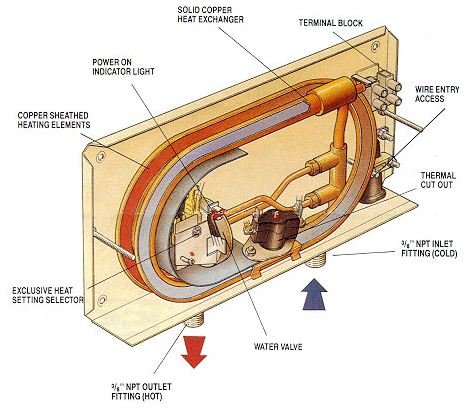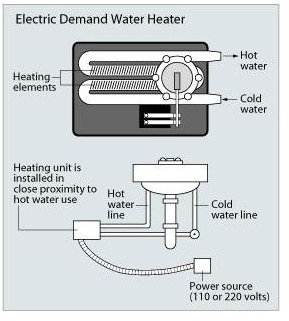Tankless Water Heaters - Principle, Design, and Operation
Introduction to Tankless Water Heaters
Tankless water heaters, as the name suggests, have no tank for storage purposes. Sometimes called “on-demand” water heaters, they overcome many of the disadvantages of traditional water heaters. In a previous article, we discussed gas and electric water heaters with storage tanks. Here we will look at tankless water heaters and their advantages.
Drawbacks of Water Heaters with Tanks
Water heaters with tanks are generally reliable, but there are certain issues which cause problems occasionally. They are:
- Inadequate or no hot water
- Rusted water
- Bad odor
- Water leaking from the base of the water heater
There are situations where we face inadequate hot water due to high consumption and no hot water when the heating element fails. The storage tank may get rusted resulting in rusted water and so on.
This rusting of tank and odor can be eliminated in the case of the tankless water heater, where the concept of the storage tank is completely absent.
On-Demand Water Heating
The primary concept of tankless system is heating water on-demand, or heating water only as and when you need it instead of continuously heating the water stored in a tank. If one can use a tankless system effectively, a considerable amount of money can be saved along with saving energy such as gas and electricity. Furthermore, a tankless water heater has a better life time than the conventional tank systems.
But on the other hand, there are also some disadvantages which need to be considered. The upgrade and costs of various parts of a tankless system is very costly and the actual cost of buying a tankless system is very high when comparing to tank systems.
Improper usage of tankless systems can make the monthly utility bills very expensive. So we always have to exercise care that the system is being used properly.
A tankless system can be operated using natural gas, electric coils, and propane.
Standby Heat Loss
Stand by heat loss is one of the important factors to be considered before dealing with tankless water heaters.
While using a Storage tank, the water heater heats the water continuously to maintain a constant temperature. This happens even when the water is not being used. The energy which is used to maintain the constant water temperature even when it is not being used is called “standby heat loss.” This loss is absent in tankless system thus reducing the energy consumption. The energy source may be gas or electricity. In either case the energy is saved, so these systems are considered energy efficient.
How Tankless Water Heaters Work
The tankless system uses a heat exchanger to heat the water. The heat exchanger aids in transferring the heat from the gas burner (gas heater) or electric coils (electric heater) to the incoming cold water. When we turn on the hot water tap, the incoming cold water passes through the heat exchanger. The heat exchanger heats water according to the specified temperature and hot water is supplied back to the customer.
There is flow sensor or flow switch which detects the water flow and turns on the system to heat the water.

Point of Use vs Whole House Tankless Water Heaters
Generally there are 2 models of tankless systems.
- Point-of-use
- Whole-house
Point-of-use is generally a small unit that serves one or two outlets. Whole-house systems are larger and more expensive units which can serve many outlets at a time. Whole-house units have multiple heat exchangers for this purpose.
Generally we use electric coils for point-of-use systems and propane for whole-house system. The only reason behind this is the economy involved. Using electric coils for whole-house system may increase your monthly electricity bills.
Point-of-use systems are beneficial when the unit is placed closer to the outlet. But what happens if it is away from the outlet?
When the point-of-use systems are placed away from the outlet, a considerable amount of time is taken by the hot water to reach the outlet. This time is called the lag time. Lag time is the time taken by the hot water to reach the outlet. This lag time can be avoided by placing the point-of-use systems closer to the outlet.

Factors to be Considered when Buying a Tankless Water Heater
There are three factors to be considered before buying a water heater. First you need to determine the size of the unit and capacity. Then consider whether you need a whole-house system or a point-of-use system. Everything depends on three factors.
- Temperature with which the cold water enters the unit.
- Flow rate- The amount or volume of water the unit has to heat.
- The preset temperature- The temperature with which the hot water goes to the outlets.
The first factor depends on the place where you live. If you are residing in India, the temperature of the incoming water is warmer than the temperature of cold water in US. The tankless units have to heat the incoming cold water more in parts of the US than in India. So the place where you live plays a key role for buying a tankless water heater.
For example: Assume that we have to heat the incoming cold water to a temperature of 140F. If the temperature of incoming cold water in India is 80F, then we have to heat the water by only 60F. Suppose that the temperature of incoming cold water in the US is 55F or 60F. Then we have to heat the water by 80F and send it to the outlet. So for colder places, the heater has to be rated higher than the warmer places. Similarly the other two factors also play an important role in the determining the size of the unit.
Benefits
- Tankless systems can last five to ten years more than conventional heaters.
- These systems never run out of hot water.
- They are energy efficient systems as the standby heat loss is eliminated.
Disadvantages
- They cost three times as that of conventional heaters with tanks.
- Lag time is one of the major issues to be considered as water gets wasted due to this phenomenon.
- Gas powered tankless systems results in the production of greenhouse gases.
Related Reading
Working Principles of Water Heaters - Almost everyone uses a water heater in day to day life. But how many of us have the exact idea of how it works and how the cold water is converted to hot water? What are the elements that are used for this process?
